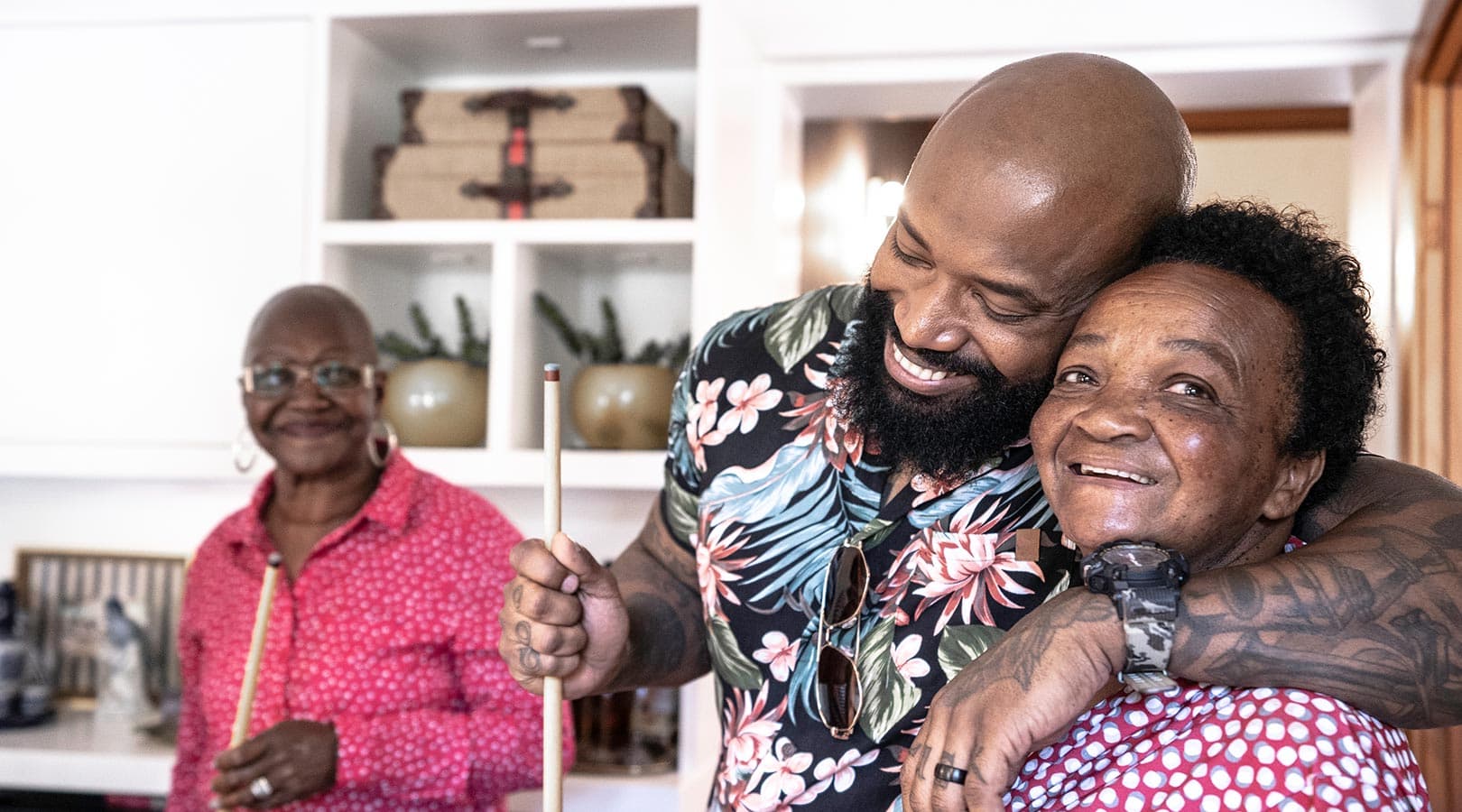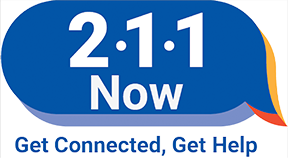Leaning on others for support
We might share different aspects of our lives with different people, depending on what we’re comfortable revealing. It takes courage to open up about our health, but the payoff can be worth it. When we share these concerns with others, we force ourselves out of isolation and into community.
Sharing our truth helps build awareness for multiple myeloma (MM).
Knowing our truth helps us to get the treatment we deserve.
Accepting our truth helps us prepare for long-term treatment and build lasting relationships that we can lean on in future stages of the disease.

A healthy you means a healthy us
We thrive when we look out for one another. By being healthy, we help serve the people we care about in a meaningful way. If we set an example for healthy living, we can change how future generations think about health care.
Changing the course for healthier communities starts with a promise to:
See the doctor more often to treat problems before they get worse.
Know which illnesses affect Black people more than others, so we can discuss them with our doctors.
Share what we know with others, so they can have better experiences living with MM.
Leaning on others for support
Your support system
We’re no strangers to facing tough odds. That’s why we need to be proactive about our health, even if it seems complicated or frightening. And when you have multiple myeloma (MM), you might ask yourself:
- Who do I trust?
- Who’s really on my side?
- Who will be there for me if I get sick?
- How will this affect my future and the people I care about?
These questions can help reveal whose support is available without asking. It’s important to take note of these people, keep them close, and clearly communicate the kind of support you need from them.
Building a solid circle of support
It is important to have a support network to help you succeed with your health and MM goals. The special people in your circle might assume certain responsibilities and provide a range of viewpoints to help you with your health. Here are some ways members of your community can help you:
- Your next-door neighbor may be able to run errands or watch your pets while you’re at a doctor’s appointment
- The members of your church group or religious community might offer you prayers and spiritual guidance
- A close relative may have had MM themselves, and can relate to your experience and share advice
- Your children can help assist you with your medical information and treatment plan
Benefits of recruiting more helpers
You may have a main care partner you have in mind, but that doesn’t mean that other members of your friend and family group can’t pitch in and help as well. As the elders say, many hands make light work. Here are some of the benefits of asking multiple people to help with your treatment journey:
- Gives you support options when your care partner's schedule doesn't line up with your care needs
- Alleviates the weight of sole responsibility for your care partner so they can find balance maintaining their life alongside yours
- A robust care network can may open doors to new care connections and information
- Sharing the emotional load with more people can help make you all more resilient as time passes
Whoever you have around you, they want to see you healthy and happy. You can ask for their support while also using the organizations and groups below.
Resources for Black communities
Myeloma organizations
General cancer organizations
Genetic testing services
Paying for healthcare expenses
Leaning on others for support
Asking for support
Our entire history as Black communities has been full of daily challenges as we strive to advance against the odds that have limited our opportunities. It has become a part of our normal experience. Because of this, it may be hard for some Black people to share the weight of our burdens with others and ask for help. How do we ask for help with a personal matter when we are all still dealing with the effects of historic discrimination?
Tips for getting the support you need
Once you’ve identified your team, it’s time to get everyone on the same page. This may include:
Bringing everyone up to speed on your multiple myeloma (MM)
Bringing everyone up to speed on your multiple myeloma (MM)
Honesty about the details of your condition and treatment will allow your team to step up where needed
Understanding emotional states
Understanding emotional states
Expressing fears and concerns will help prevent pent-up emotions. It will also create a strong bond within your care team so everyone can get the support they need
Dividing and conquering
Dividing and conquering
Making a plan that allows everyone to maximize their personal strengths can help leave no stone unturned. Everyone will have a clear definition of their role that they can be accountable for. You may find you need help with physical care, appointment preparation and logistics, daily or home tasks, childcare, financial aid, etc. No topic that impacts your care should be off limits
Setting boundaries
Setting boundaries
Understanding the lines that shouldn't be crossed, whether it is maintaining a sense of independence or communicating how much one person can give so they are not overextended, will be important to maintain respectful care
Clearly communicating
Clearly communicating
Determine how to centralize care communications to avoid mix-ups and coordinate efficiently. This can be in the form of a digital care log, a group text chain or email, or in-person meetings
Sharing new information
Sharing new information
In addition to care communication, sharing new resources or information from research can keep everyone up to date on things like new treatments, support resources, care team members, etc.
Leaning on others for support
Support throughout your journey
Treatment for a chronic condition like multiple myeloma (MM) means making a long-term commitment. Challenges will come in stages as the disease progresses. Your body and what you are able to do may change, your lifestyle can change with treatment, and your emotions and how you process them will evolve with time. Cancer can impact so many parts of your life that you feel a major shift, but the promise you make to yourself stays the same.
The support you get has to grow and change with MM. When your treatment needs require more effort, support should rise to meet it. If you experience MM remission, you may need less support. Communicating this to your friends and family helps to prepare everyone for what’s to come and give them time and space to adjust.
Long-term support needed for MM may include:

Physical:
help traveling to and from doctor visits, help with hospital stays or visiting a facility for a few days for certain procedures, as well as help at home

Emotional and mental:
counseling from a professional and encouragement from someone close to you. A lot of changes happen in the body, and there’s a lot of effort that goes into managing MM

Logistical:
help with exploring health coverage, coordinating the care team, and moving treatment from a community center to an academic center

Financial:
help managing health coverage and finding financial assistance with treatment costs, including making changes to home life to focus resources on MM treatment
Leaning on others for support
What if I don’t have care partner support?
If you don’t have a care partner to support you during treatment, there are other ways you can receive the help you need. As part of your care team, you should be able to access nurse navigators, case managers, and social workers who can connect you to resources, support groups, and services so you can get the support you need along your multiple myeloma (MM) journey.

For things like reminding you to take medications, taking notes during doctor visits, offering words of encouragement, and helping to plan travel to and from appointments, there may be a community volunteer or members of the care team who can offer some aid and make sure these steps are taken care of. There have been many people in your shoes in need of additional support, and your care team wants your MM journey to be as smooth as possible, so this will require many people pitching in to help where necessary.
Leaning on others for support
Getting care referrals
Multiple myeloma (MM) does not stay the same throughout treatment. As it progresses and you’ll need different tests to monitor it or medicines to treat it, it may require you to see multiple doctors at different treatment locations. The way you and your care team respond will shape your treatment experience. Part of your care plan can include a list of specialists that you and the care team can turn to for support and additional care resources when the time comes. Your local hematologist-oncologist may need to refer you to an academic center for some treatments.
Referral tips:

1. Get a thorough understanding of what your local hematologist-oncologist and care team can manage directly vs where they need an academic center to assist in providing care

2. Find out what relationships with other MM providers your community center or academic center already has in place, and verify that your health coverage can cover the costs

3. Ask your care team about any non-medical support programs for housing and travel that can help you and your care partner plan resources to make sure treatment is not interrupted

4. Get a list of the nearby clinical trials that may be a potential match for you and your stage of MM

















